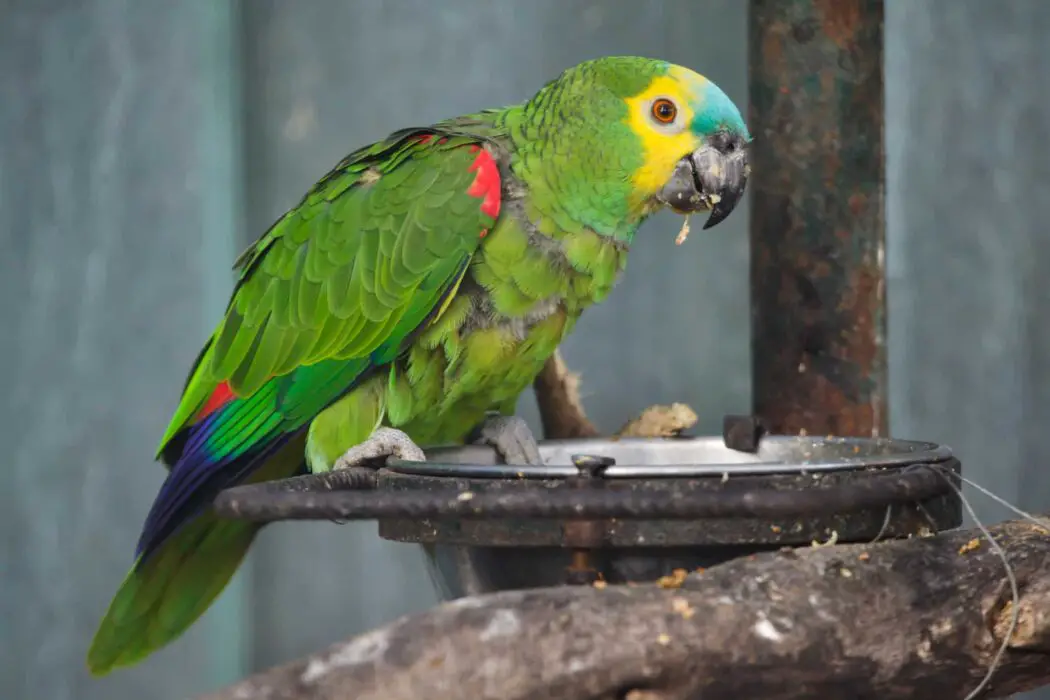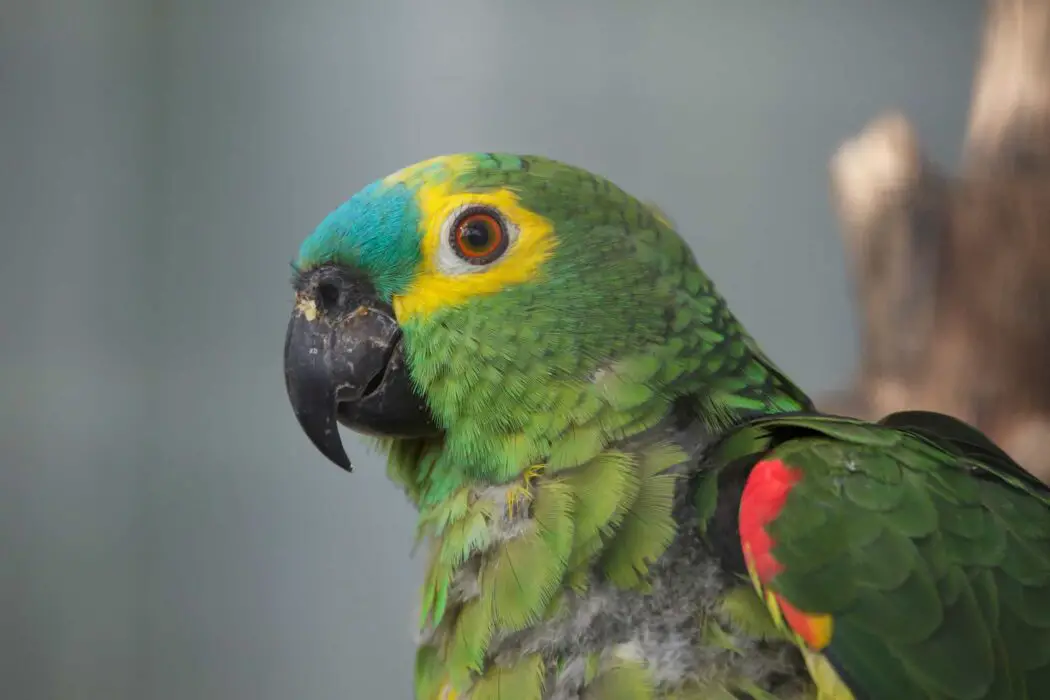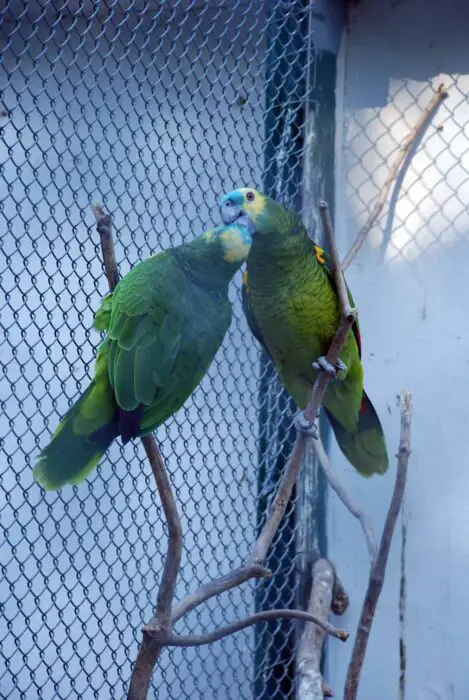Birds are mostly wanted as pets because they become great companions. In addition, birds’ lifespan is usually longer than dogs or cats, so this makes them loved pets for humans.
Depending on the parrot’s size, the lifespan can vary from 5-15 years (parakeets) to 40-60 years (African gray parrots).
Different parrots have different life duration. So if you are wondering how long blue-fronted amazons live, this article is for you.
This is an excellent question to research. But to give a short answer, the blue-fronted amazons usually live 35 to 55 years. They have the most extended lifespan among other parrot species. Some amazons were also reported to live up to 70 years!
These medium-sized birds have bright green feathering with clear blue marks around the beak. These marks actually gave the name for this parrot – blue-fronted that is also known as turquoise fronted amazons. Around the eye, these parrots have yellow coloring.
Green Parrots 101 (With Photo and Video)
Their native habitat is in South America (Argentina and Brazil).
Blue-fronted amazons are tomfoolery and engaging birds with quite a character.
This article will investigate what adds to blue-fronted amazons’ life expectancy, their character, the sort of care they need, whether they are imperiled, and different subtleties.
What Extends Blue-Fronted Amazons’ Lifespan?

The key to extended blue-fronted amazon parrots lifespan is a combination of enough exercise and a proper diet. They usually eat berries, fruits, seeds, nuts, leaf buds, and even blossoms in their natural habitat.
When in captivity, ensure the proper rotation of fresh fruits and vegetables in the menu of these parrots completed with regular seed pellets.
Please note that turquoise fronted amazons risk gaining excess weight and hyperthyroidism, so be careful when adding nuts and seeds into their menu.
Exclude avocados and sweets as they can be toxic to your blue-fronted amazon parrot.
Also, these parrots should exercise at least two hours per day. Make sure you let them out of the cage for two hours during the day. This time they should fly around the room. You can also communicate and play with the bird.
What Can Short the Lifespan of Blue-Fronted Amazons?
Another danger that can shorten the lifespan of these parrots is bacterial infections.
Bacteria can build up in their water bowls, seeds, and other food you keep long in their cage, so be sure to do the cleaning in their cage and provide parrots with fresh water daily.

Dusty places can also cause bacterial infection in the parrot.
Watch for hacking, eyes redness, runny nose, enlarged beaks, puffing feathers, or appetite loss, and make sure to take the parrot to the vet at the earliest to prevent illness and health issues.
The blue-fronted amazon may live less in captivity due to a lack of social interaction, physical activity, and healthy food.
These gorgeous parrots often become a target of illegal trade in South America. Pothunters will take them off their nests and may carry them in unsafe boxes that may reduce their lifespan.
While more cases of illegal trading happen in Brazil, still it’s better to deal with an entrusted breeder to be sure you purchase a healthy bird.
How Long Does Your Parrot Live?
What Is the Personality of a Blue-Fronted Amazon?
Blue-fronted amazons are funny and friendly; they like to entertain and talk with the owner. Parrots can learn simple tricks and enjoy performing funny shows for their owners, and like to be in the center of attention.
They appreciate investing energy with their proprietors, so on the off chance that you, in all actuality, do embrace one, make a point to cut out day-to-day opportunities to mingle and collaborate.
Another thing that makes amazons are popular companions is that they can keep themselves busy as long as you supply them with lots of toys and space for playing.
So if you are about to adopt a blue-fronted amazon, ensure you have plenty of time for socializing, plenty of space, and enough toys.
Are Blue-Fronted Amazons Loud?
Yes, indeed. Turquoise-fronted amazons are known for their love for singing or cackling to draw more attention to their personality certainly.
They squawk in the morning and evening at sunrise and sunset. This instinct left from the wild allows them to mark the time of the day when they are in their flock.
These parrots like to talk, and with time they learn words and phrases mimicking the owner’s speech.
Their screeching and chatty nature makes blue-fronted amazons less appropriate for individuals who live in high rises.
A Full List of Macaw Types (With Photo and Video)
Are Blue-Fronted Amazons Aggressive?

No, blue-fronted amazons are not aggressive usually. They get along well with other pets in the household and with the owner.
If they perceive some actions as dangerous, they may demonstrate aggressive or territorial behavior. They can even try and protect the owner if they think they are in danger for some reason.
Males parrots tend to protect their territory in the cage when they are in their mating season or if they don’t get enough physical activity and interaction with their owner.
Are Green Cheek Conures Aggressive? Tips to Build Trust
Do Blue-Fronted Amazons Need a Lot of Care?
No, blue-fronted amazon doesn’t require tons of care. What they really need is enough interaction and communication during the day.
This can be gained by placing the cage in the room where there are often many people, for example, kitchen. In this way, you can communicate with your parrot when cooking, cleaning, or even watching TV.
These parrots require a big cage, so their movements are not restricted. To keep your bird occupied, get lots of toys, things to chew, and to do exercises on. These can be perches, ladders, and swings. If supplying the cage with all these toys is a problem, ensure the parrot gets lots of out-of-cage time with you.
Are Blue-Fronted Amazons Endangered?
Not yet “endangered” but “near threatened” that is the label given to blue-fronted amazon by the International Union for Conservation of Nature.
Amazons often become a target of illegal trading, especially in Brazil. This leads to the population reduction among blue-fronted amazons.
Exotic shops and pet stores are places in the USA and other countries where you can find blue-fronted amazons. However, our recommendation is to get such birds from trusted breeders so you can be sure of their origin and health.
Are Parrots Safe for Families With Babies?
To sum up
Blue-fronted amazons are exciting birds and can live for quite a long time with the proper consideration.
Their friendly character makes them a great pet however requires time responsibility from proprietors to guarantee they get the social association to keep them cheerful.


